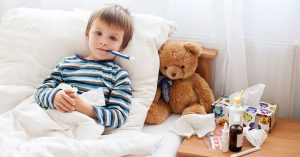
If you have a child in school or a childcare program, you know that illnesses get spread around easily and quickly. But every little cough and sniffle does not indicate they need to stay home. However, some illnesses do require a sick day. According to the American Academy of Pediatrics’ site healthychildren.org, your child should stay home from school if:
- Your child can’t participate comfortably in lessons or activities
- Your child requires more care than a teacher can reasonably provide
- Your child has an illness that poses a risk of harmful disease to others
Below you’ll find a more detailed guide to help you decide when to keep your child home from school.
Fever
If your child has a fever, they should stay home from school. Your child’s school or childcare facility may have specific rules about fevers, so make sure you know the guidelines. In general, a fever of 100 degrees Fahrenheit is the threshold for staying home from school. (In case you catch something from your little one, this also happens to be the rule for adults staying home from work.)
Again, your child’s school may have specific guidelines, but usually, children can return to school 24 hours after their fever is gone.
Flu
The flu is highly contagious, so children with the flu should be kept home. Also, the symptoms of the flu often make children unable to participate in class. If your child has a fever, chills, cough, sore throat, headache, body aches, or abnormal fatigue, they should be kept home. If needed, they can see their pediatrician for a confirmed diagnosis.
Your child can return to school when they no longer have a fever and they feel up to participating in class. Even if their fever has broken, keep in mind that some flu symptoms may still keep them from being able to go to school. They should be close to their normal level of activity before going back to school or daycare. You know your child best, so you can use your judgment to decide if your child is ready to return to school after the flu.
Vomiting or Diarrhea
If your child is nauseated, vomiting, or has diarrhea they should stay home from school. They would not be able to participate and the viruses that cause gastrointestinal distress are often contagious.
For a child to be able to go back to school after they’ve been vomiting, they need to be able to tolerate both liquids and solid food without vomiting again. Start by giving your child sips of water and then wait an hour. If they do not vomit, introduce more liquids and bland solid foods like toast or crackers. If they are able to eat without vomiting and don’t have any other symptoms like fever, they can go back to school.
Chickenpox
Chickenpox is widely vaccinated against, but some children do not receive the vaccine or get infected before they receive the full dose. A child with chickenpox should stay home from school until the sores are dry and crusted over, which usually takes about a week.
Hand, Foot, and Mouth
Hand, foot, and mouth disease is a viral infection that is easily spread, especially in children under 5. Therefore, if your child has symptoms of hand, foot, and mouth, you should keep them home. It can be hard to determine your child has this infection until they develop the rash and mouth sores that make it apparent.
Symptoms that appear before the sores can seem like a regular cold, including fever, sore throat, runny nose, and loss of appetite. If your child develops a rash of small blisters on the fingers, hands, feet, and inside the mouth, they should see their pediatrician and be kept home from school. After the fever has been gone for 24 hours and no new blisters have appeared, they can return to school.
Strep Throat
A child that is diagnosed with strep throat should be kept home until they have had one or two doses of antibiotics. Usually, this means they need to stay home a day or two after the diagnosis. Ask your doctor about how many doses your child needs before going back to school.
Mumps, Measles & Other Contagious Infections
Highly contagious illnesses like mumps, measles, rubella, whooping cough, and hepatitis A are somewhat rare these days, but it’s not impossible for your child to get one of these viruses. Check with your doctor about the specific guidelines for when to keep your child home from school with these infections.
Contact Your Pediatrician
At HealthPark Pediatrics, we are dedicated to providing your child with compassionate and comprehensive care at all stages of childhood through young adulthood. This includes preventative care during well-visits and treatment for illnesses during sick visits. If you need to know when to keep your child home from school, we can help. To make an appointment call (919) 896-7066.



